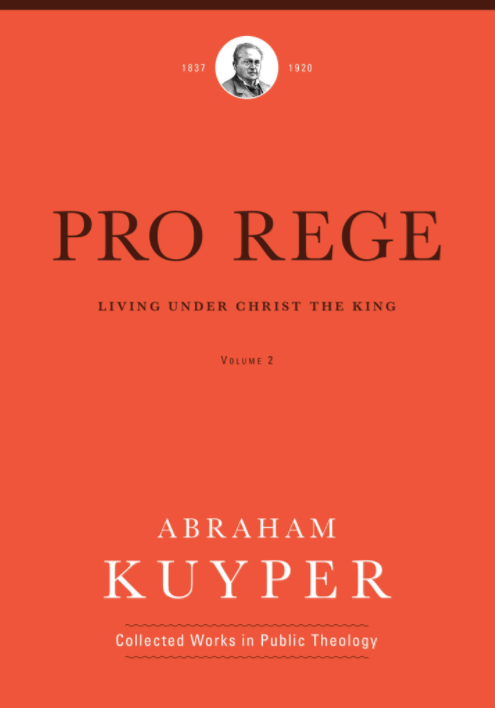How are we to live in a fallen world under Christ the King?
In partnership with the Acton Institute, Lexham Press has now released Pro Rege, Vol. 2: Living Under Christ the King, the second in a three-volume series on the lordship of Christ (find Volume 1 here).
Originally written as a series of articles for readers of De Herault (The Herald), the work serves as a complement to Kuyper’s three volumes on Common Grace, focusing on Christ’s claim that “All authority in heaven and on earth has been given to me.” For Kuyper, it was crucial that Christians be mindful not only of Christ’s heavenly authority and dominion, but also remember and recognize his kingship here on earth, and all that it implies across human society.

Kuyper touches on many of these same themes and subjects in his previous work, Common Grace, reminding us that God is still active in “everyday life” and encouraging us toward active engagement in politics, science, the arts. But whereas Common Grace might seem to imply a certain optimism about our engagement with the world (given its specific focus), Buijs explains that Pro Rege offers a distinct shift in emphasis. In Pro Rege, Kuyper reminds us that “the world that is graciously maintained by God is at the same time occupied territory,” and that “there is a struggle going on between light and darkness”:
In spite of common grace, there is much darkness in politics (Kuyper lived in an age in which there were overwhelmingly more dictatorships than constitutional democracies—certainly different than today, but not by much). There is darkness in philosophy, darkness in economics (read what Kuyper has to say about the dominance of money), darkness in science, darkness in the arts. Ultimately, it is a struggle about spiritual rulership, about spiritual kingship. Who is the King of the world: Christ or the prince of darkness?
In Volume 1 of Pro Rege, Kuyper explains why such explanation and exploration is needed in the first place, offering what he describes as “a protest against the darkening and undermining of the Christian confession of Jesus’ kingship.”
In Volume 2, he moves to the “practical questions regarding the calling, task, and responsibility that Christ’s kingship imposes upon us as his subjects.” Again, how are we to live in a fallen world under Christ the King?
As Kuyper explains in his introduction:
The kingship of Christ does not depend on us in any way. It arose entirely outside of our own doing and finds the sole source of its authority in the Triune God and his divine ordination. Nevertheless, it has been recognized from days of old that there is no such thing as a king without subjects, and that a kingdom without citizens is not real but exists in the imagination alone. When we speak of Jesus’ kingship, therefore, we must think immediately also of ourselves as the subjects of King Jesus and of what is demanded of us in that capacity as his subjects. At the same time, we must be careful not to draw any direct conclusions from this recognition, as if what the redeemed must do for Christ as their King makes his kingship depend in any way on their devoted efforts. The foundation on which the edifice of Jesus’ kingship has been built is not the faith and devotion of his subjects, but rests in God’s good pleasure alone.
In the pages that follow, Kuyper touches on a wide range of those “practical questions,” including discussions of practical wisdom and application in areas ranging from devotional life, ecclesiology, and vocational ministry to the family, business, politics, and philanthropy.
The result is a work that offers not only a robust framework for wider cultural engagement, but specific teaching and guidance on how to be “in but not of the world,” keeping the kingship of Christ at the forefront of our hearts and minds in all that we do.
The Abraham Kuyper Translation Project anticipates the future publication of the third volume of Pro Rege, as well as additional anthologies of Kuyper’s writings on education, the church, Islam, charity and justice, and business and economics. For updates on new releases, follow the Acton Institute and the Abraham Kuyper Translation Society.